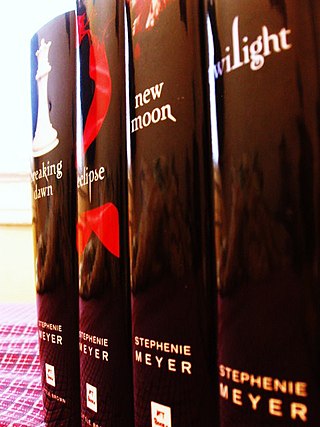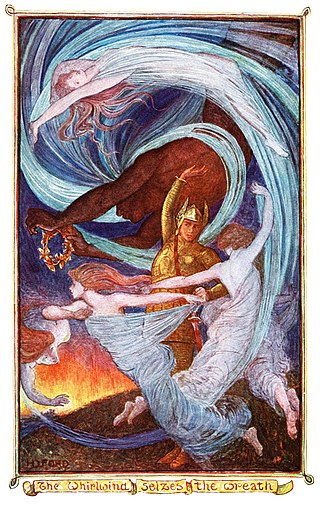Fantasy comedy or comic fantasy is a subgenre of fantasy that is primarily humorous in intent and tone. Typically set in imaginary worlds, fantasy comedy often involves puns on, and parodies of, other works of fantasy.

Fantasy films are films that belong to the fantasy genre with fantastic themes, usually magic, supernatural events, mythology, folklore, or exotic fantasy worlds. The genre is considered a form of speculative fiction alongside science fiction films and horror films, although the genres do overlap. Fantasy films often have an element of magic, myth, wonder, escapism, and the extraordinary.

Sword and sorcery (S&S), or heroic fantasy, is a subgenre of fantasy characterized by sword-wielding heroes engaged in exciting and violent adventures. Elements of romance, magic, and the supernatural are also often present. Unlike works of high fantasy, the tales, though dramatic, focus on personal battles rather than world-endangering matters. The genre originated from the early-1930s works of Robert E. Howard. While there is a chance example from 1953, Fritz Leiber re-coined the term "sword and sorcery" in the 6 April 1961 issue of the fantasy fanzine Ancalagon, to describe Howard and the stories that were influenced by his works. In parallel with "sword and sorcery", the term "heroic fantasy" is used, although it is a more loosely defined genre.
Contemporary fantasy is a subgenre of fantasy set in the present day. It is perhaps most popular for its subgenres, Occult detective fiction, urban fantasy, low Fantasy, Supernatural Fiction and Paranormal fiction. Several authors note that in contemporary fantasy, magical or fantastic elements are separate or secret from the mundane world.

Speculative fiction is an umbrella genre of fiction that encompasses all the subgenres that depart from realism, or strictly imitating everyday reality, instead presenting fantastical, supernatural, futuristic, or other imaginative realms. This catch-all genre includes, but is not limited to, science fiction, fantasy, horror, slipstream, magical realism, superhero fiction, alternate history, utopia and dystopia, fairy tales, steampunk, cyberpunk, weird fiction, and some apocalyptic and post-apocalyptic fiction. The term has been used for works of literature, film, television, drama, video games, radio, and their hybrids.

Science fantasy is a hybrid genre within speculative fiction that simultaneously draws upon or combines tropes and elements from both science fiction and fantasy. In a conventional science fiction story, the world is presented as grounded by the laws of nature and comprehensible by science, while a conventional fantasy story contains mostly supernatural elements that do not obey the scientific laws of the real world. The world of science fantasy, however, is laid out to be scientifically logical and often supplied with hard science-like explanations of any supernatural elements.
Urban fantasy is a subgenre of fantasy, placing supernatural elements in a contemporary urban setting. The combination provides the writer with a platform for classic fantasy tropes, quixotic plot-elements, and unusual characters—without demanding the creation of an entire imaginary world.
Low fantasy, or intrusion fantasy, is a subgenre of fantasy fiction in which magical events intrude on an otherwise-normal world. The term thus contrasts with high fantasy stories, which take place in fictional worlds that have their own sets of rules and physical laws.
Dark fantasy, also called fantasy horror, is a subgenre of fantasy literary, artistic, and cinematic works that incorporates disturbing and frightening themes. The term is ambiguously used to describe stories that combine horror elements with one or other of the standard formulas of fantasy.
Supernatural fiction or supernaturalist fiction is a subgenre of speculative fiction that exploits or is centered on supernatural themes, often contradicting naturalist assumptions of the real world.

Paranormal romance is a subgenre of both romantic fiction and speculative fiction. Paranormal romance focuses on romantic love and includes elements beyond the range of scientific explanation, from the speculative fiction genres of fantasy, science fiction, and horror. Paranormal romance range from traditional romances with a paranormal setting to stories with a science fiction or fantasy-based plot with a romantic subplot included. Romantic relationships between humans and vampires, shapeshifters, ghosts, and other entities of a fantastic or otherworldly nature are common.

Elements of the supernatural and the fantastic were an element of literature from its beginning. The modern fantasy genre is distinguished from tales and folklore which contain fantastic elements, first by the acknowledged fictitious nature of the work, and second by the naming of an author. Authors like George MacDonald (1824–1905) created the first explicitly fantastic works.

Weird West, also known as Weird Western, is a term used for the hybrid genres of fantasy Western, horror Western and science fiction Western. The term originated with DC's Weird Western Tales in 1972, but the idea is older as the genres have been blended since the 1930s, possibly earlier, in B-movie Westerns, comic books, movie serials and pulp magazines. Individually, the hybrid genres combine elements of the Western genre with those of fantasy, horror and science fiction respectively.

Superhero fiction is a subgenre of speculative fiction examining the adventures, personalities and ethics of costumed crime fighters known as superheroes, who often possess superhuman powers and battle similarly powered criminals known as supervillains. The genre primarily falls between hard fantasy and soft science fiction in the spectrum of scientific realism. It is most commonly associated with American comic books, though it has expanded into other media through adaptations and original works.

Fantasy is a genre of speculative fiction which involves themes of the supernatural, magic, and imaginary worlds and creatures.

The following outline is provided as an overview of and topical guide to fantasy:

Gods and demons fiction or Shenmo fiction is a subgenre of Chinese fantasy fiction that revolves around the deities, immortals, demons and monsters of Chinese mythology. The term shenmo xiaoshuo, coined in the early 20th century by the writer and literary historian Lu Xun, literally means "gods and demons novel". Representative works of shenmo fiction include the novels Journey to the West and Investiture of the Gods.









